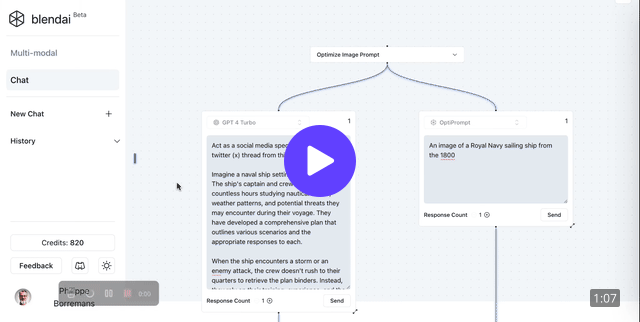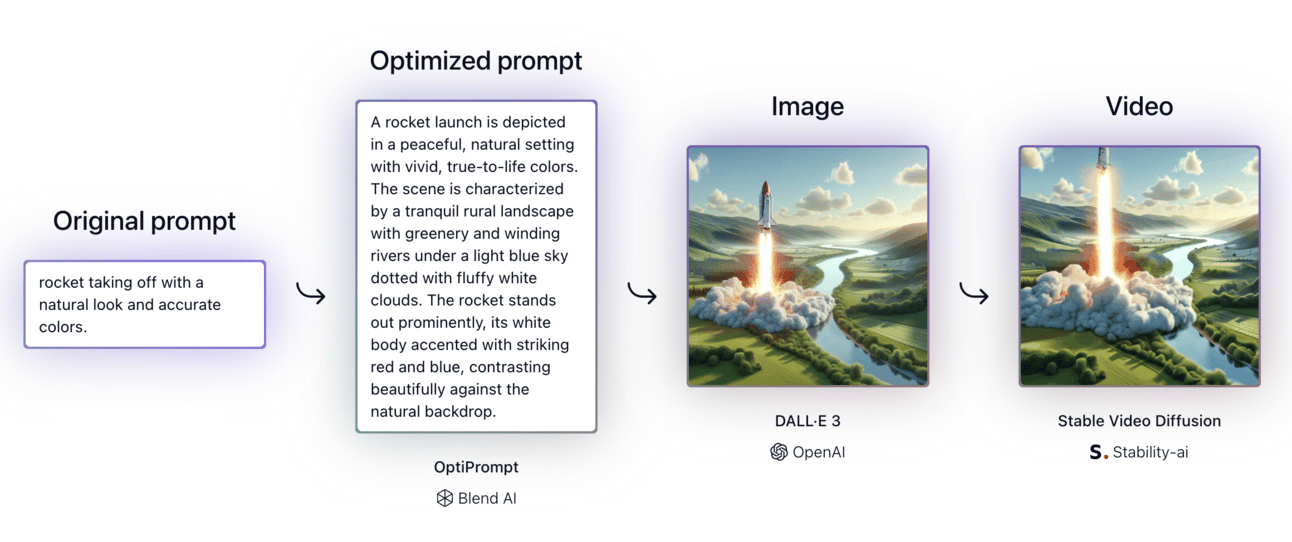Dear {{ first_name | reader }},
In this edition of the Wag The Dog newsletter, I wanted to offer you a quick overview of a new platform I recently discovered called Blend.ai and also give feedback on the recent survey I sent around.
Thanks again to all who participated in the survey. If you still would like to participate and give your input, please do so by this Friday. 👍
And finally, please check out the exclusive webinar I am planning.
We’ll be talking about the use of AI in the context of crisis communication and offer you a glimpse of the future of “virtual audiences” and AI agents in this context.
Don’t miss it!
Table of Contents
A look at Blend.ai - a multimodal content creator.

Blend AI is a rather complete AI platform that brings together the most respected artificial intelligence models.
Its multi-modal graph interface allows easy chaining of models, where you can do anything from text to text to image to video.
To simplify the content creation workflow, it provides a unified “multi-modal” user interface that enables the integration of a variety of artificial intelligence capabilities.
It’s also cost effective for users who have different requirements by using a flexible pricing model based on a pay-as-you-go principle.
Using Blend AI to create crisis simulation injects.
By specifying elements of a hypothetical crisis, you could use Blend AI to generate authentic-looking news stories and social media posts that provide a rich, interactive backdrop for training.
You could start with the “text generation” module and then move from there to “prompt optimisation” and then generate the required images. All this happens in one structured flow.

Below is an overview of all the models that Blend AI integrates today.
Text Models | Image Models |
|---|---|
Mistral Large | DALL•E 3 |
GPT 4 Turbo V | Stable Diffusion Lighting |
Perplexity Medium Online | Stable Diffusion XL |
Perplexity Small Online | Real-ESRGAN |
Al Claude 3 Opus | |
Al Claude 3 Sonnet | |
Al Claude 3 Haiku | |
Al Claude 2.1 |
Let me know if you found this “tool overview” interesting.
Survey Results: Challenges with Creating Crisis Communication Plans.
First and foremost, I'd like to thank you for your participation in my recent survey on the challenges you face when creating and implementing crisis communications plans.
Your honest responses have given me valuable insight into the most pressing issues in this important aspect of crisis management.
One of the most common issues you mentioned was stakeholder engagement and ensuring buy-in within your organisations.
I know first-hand how difficult it can be to gain executive support and ensure organisation-wide participation in the planning process. It's clear that we need to develop effective strategies to communicate the value of proactive planning and encourage collaboration between key stakeholders and departments.
Another major challenge that emerged was striking the right balance in plan development.
Many of you expressed the difficulty of covering a wide range of scenarios while keeping plans concise and actionable. I can understand how difficult it's to take a pragmatic approach while considering possible variations and details.
It's a complex task to adapt templates to different organisations, values, and ways of working. These insights stress the importance of creating flexible, adaptable plans that can be tailored to your specific needs.
Gathering accurate information and data during a crisis is an important concern that many of you have shared.
The danger of individuals withholding facts to protect themselves and the difficulty of obtaining the right data to assess the extent of a crisis are major challenges we all face. It's clear that we need to develop strategies to verify information and fill critical gaps so that our plans remain effective.
The unpredictability of crises is a major source of anxiety for many of us.
The fear of being unprepared and having to improvise due to a lack of preparation is a common theme that I'm sure we can all identify with.
Another concern that many of you have expressed is the lack of strong leadership, team cohesion, and clear roles and responsibilities during a crisis.
These findings stress the importance of regular crisis simulations and training to build trust and preparedness.
Effective communication strategies and skills are at the heart of successful crisis communication, and many of you have mentioned challenges in this area.
Identifying the right audience, using the right tone of voice and language, and managing social media coverage are important issues we all struggle with. Clearly, we need resources and training to help us do effective social listening and ensure our organisations are driving the narrative during a crisis.
When you're looking for resources to support your crisis communications planning, you value practical, actionable content.
You place a high value on frameworks that address important issues and values, step-by-step instructions, and straightforward, simple-to-use resources in multiple languages.
You also value relevant examples and the expertise of the authors. I hear you, and I am committed to developing resources that fulfil these needs.
Finally, some of you have expressed interest in the role of new technologies such as AI and foresight science in crisis communications planning.
Your responses to the survey have provided valuable insights into the challenges we all face in crisis communications planning.
By sharing your experiences and concerns with me, you have helped to shape the direction of future resources and support.
I'm committed to developing practical, actionable resources to help us all overcome these challenges and master the art of crisis communications planning.
Now, my next step is to go back to the drawing board and start creating the e-learning course that I had in mind. I'll be taking all the insights and perspectives you've kindly shared with me to make it even better.
Thanks again for your participation and commitment to this important aspect of crisis management. 🙏
Webinar: The future of Crisis Simulations
My guest will be Dominik Scherm, founder of Simulatrex, an innovative open-source platform leveraging Large Language Models (LLMs) for simulation purposes.
Dominik and I have been working together, and during this webinar you will be able to see early demo’s of what really is the future of crisis simulations and message testing.
Don’t miss this webinar.
Sponsor
The Rundown is the world’s fastest-growing AI newsletter, with over 500,000+ readers staying up-to-date with the latest AI news and learning how to apply it.
Our research team spends all day learning what’s new in AI, then distills the most important developments into one free email every morning.
What I am reading/testing/checking out:
Webinar: The Changing Cyber Risk Landscape: with Anthony Long, Head of Threat Intelligence, LRQA Nettitude
Article: Headed For A Crisis? Corporate Culture Can Provide Early Warning.
AI Prompt Library: The prompt library by Anthropic
How satisfied were you with the content in this edition? 📚
PS: I hope you've enjoyed this newsletter! Creating it each weekend is a labour of love that I provide for free. If you've found my writing valuable, the best way to support it is by sharing it with others. Please click the share links below to spread the word with your friends and colleagues; it would mean so much to me. Thank you for reading!
Parts of this newsletter were created using AI technology to draft content. In addition, all AI-generated images include a caption stating, 'This image was created using AI'. These changes were made in line with the transparency requirements of the EU AI law for AI-generated content.


